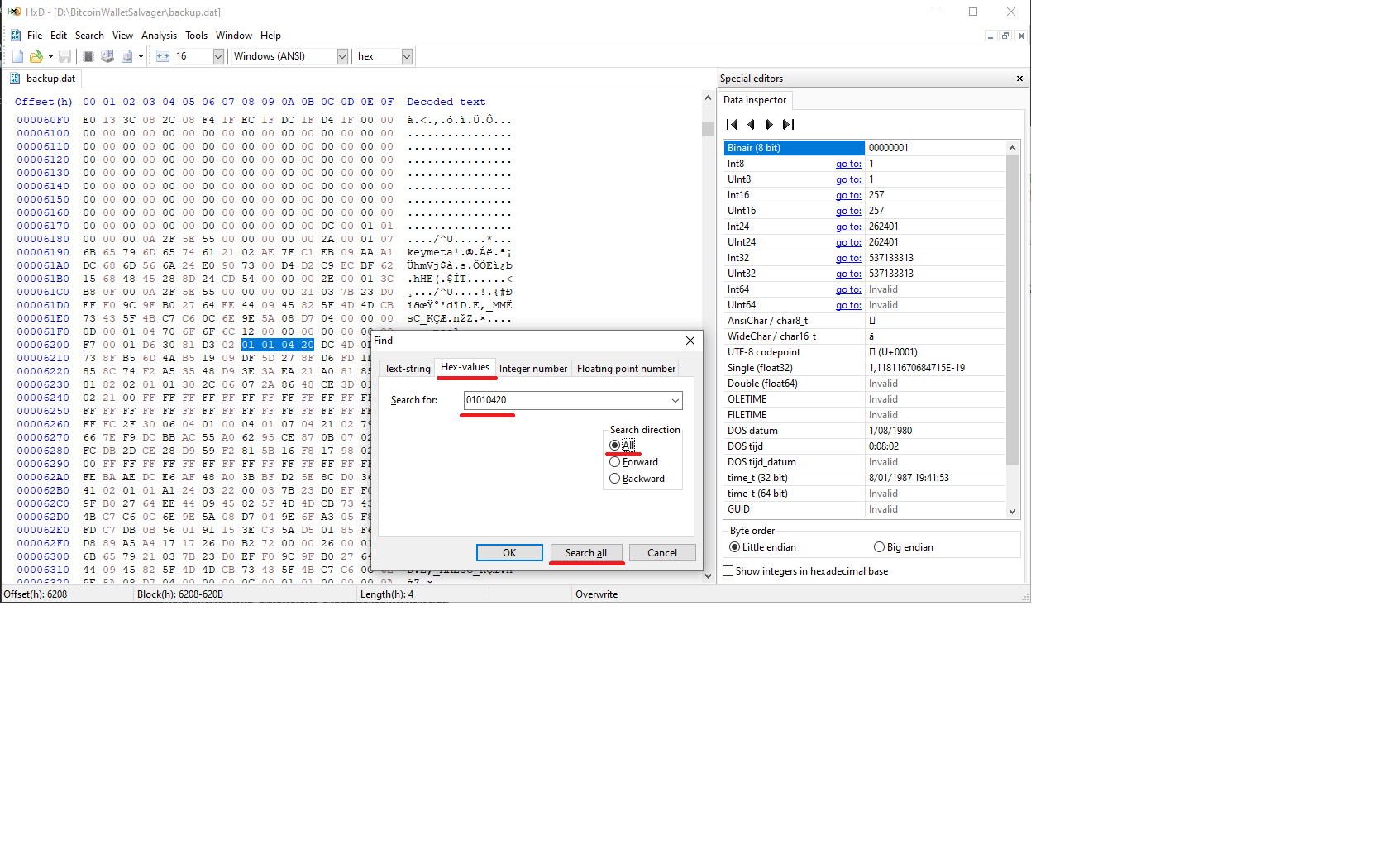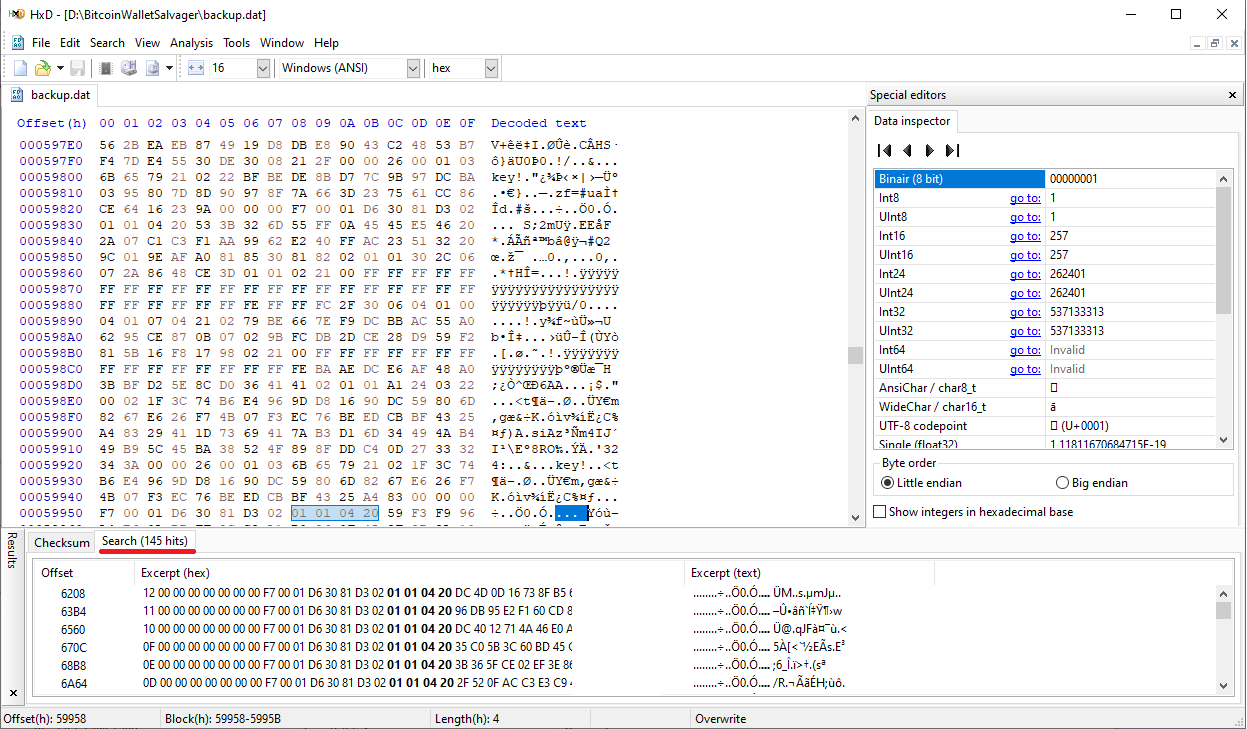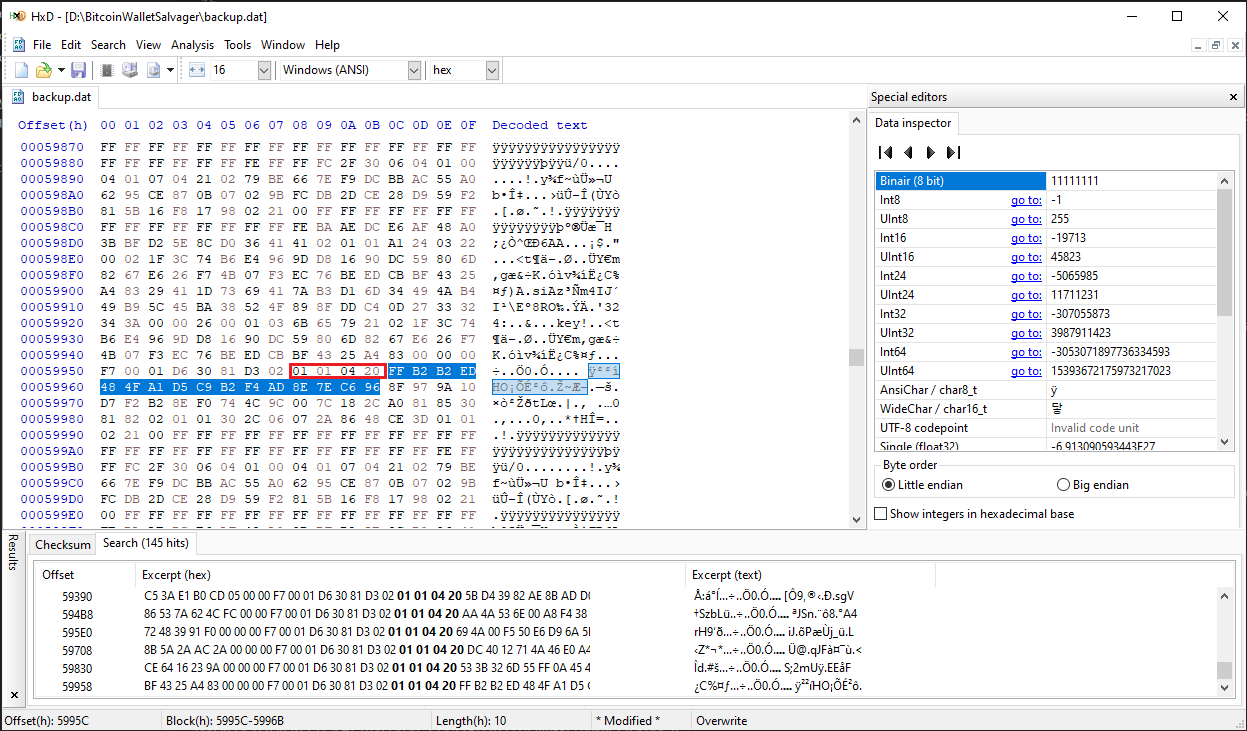Corrupted Bitcoin Wallet + 30 Lines Of Code = 3000 USD
The Story
A friend of a relative had brought in their Macbook Air, and kindly asked me to repair it. This required me to download the latest MacOS for which I didn’t have enough space for. In a desperate attempt, I decided to clean up my external hard drive, removing files that were taking up too much storage.
This is the exact moment that karma had found its way to my 4 AM adventure to fix this MacBook.
To my surprise I found a folder named “Btc”, where I stored episode of television shows. Apparently it has been there since 2015 - this must have been my very first wallet!
Sadly, the wallet wouldn’t open in bitcoin core, it has been corrupted.
The db.log outputs the logs for the BerkeleyDB wallet file, it indicated the following error message:
file wallet.dat has LSN 780/2077553, past end of log at 1/333
Commonly caused by moving a database from one database environment
to another without clearing the database LSNs, or by removing all of
the log files from a database environment
DB_ENV->log_flush: LSN of 780/2077553 past current end-of-log of 1/333
Database environment corrupt; the wrong log files may have been removed or incompatible database files imported from another environment
Therefore I was forced to salvage the wallet somehow.
The Bitcoin Core software has an option -salvagewallet which did not appear to help.
A bit of googling around and I found out that uncompressed private keys are prepended with 01 01 04 20.
Time to take a quick scroll through the file in HxD, a popular hex editor!


I didn’t expect to get 145 hits, but what I certainly didn’t want to do was manually converting all of those hits to private keys and checking the balance.

The private key is 32 bytes long and is just after our prefix.
ffb2b2ed484fa1d5c9b2f4ad8e7ec696
So I got to work, the result is below.
Usage
pip install bit
Take the code below and put in a file named salvage.py
Do not forget to uncomment and change the address variable on line 7.
Finally, run the script!
python salvage.py
It will output something like this, and if it finds funds, will automatically transfer them over to the address your specified.
PS: do not post this publicly, the first string is the private key, followed by the address and finally the amount of btc.
91236845f793a1aabd01c1d9fe615b8b 14uxHyEs1rKcPTYxnxMFW9soVTgvQsGvZq 0
323a961695929abf201386aaf2187e1 1tEiRCzpR4fKzvTejZV3MJhymx1iDmHNd 0
f94048834d85608f3a822aa84799fb8f 1JgH79RGzm9QwbYKU8LSs1hiDHsNdvrhR 0
365480736196084e8d6c7bf7b5a5943d 16CUqJjUEpkE7n34UKjTGBn5ZWAC1EGbep 0
636c0638ff10d8d19e9f36b5bed1e06 1MefrcgGg8cuSRSFbjxBwMsid6FAXf2FNb 0
aba4471c95f8217c3bbfdfddde4e17c0 1GfuKWVfk9jcu9hoNekP8DxCu2AUvDWsH3 0
a46802436a1722a0494ea88c391e2358 1CZ1LepDyk4rbD9tbYpUW1fpCJfjGuWb9J 0
23cf4f0d928d0cbcb3791ff659d81ed7 1KvCXp43MxHZGA1uAZeL1qEww8Zvx7syHd 0
d9310b543473af26aaab9e7400b4070 1B1z1GDyUPCg63NwPr4JRNg9omrHnmtcgW 0
b19a010122ce93ced3f5889109e5af99 1HDs9h8SwZn95kBTU3VWZqRfcs1ZBUe8de 0
12fd6615262cb26dc7ef8b1b7be27b8f 1E3HW9Bb6GiD9d79oJsMZB52j9dXshmhzv 0
19cad87841864304a23812a893c8dfe0 18gxN33f8KYGWH9NxrJo1FBkAVq4L2im9B 0
2ede1602dc2a0574c72342362a2c446c 1C4hCdQhy1yEvRWv2qNVJkNmz61bfCPNAZ 0
a3b68584e2d9350e349a29afa555cf2b 16icLfzH2JPrzWEyNzw8Y7FRR2uUH68fG2 0
8f9fa69c9c4098ed98c7ec805131fd4f 1CZfJ3gfvfwPcfesKPxCTJo6PGAw5a4wFS 0
2d022112ea9d6710d08fcb4c695af606 1BSuQypnh14EFhZfqRVN9djjsU7yKSuEhQ 0
da406f8761d993d7138ee75b10e7600b 1LxAr1SBFmbQZacinq5qZhPSghM1Ncq33W 0
8ac6891b9ad67f860e258e82fe24aeaa 18UCnSmxLkjx6vQWULzEVX3wDyEojiFybr 0
54a005c84d9653e19771494c82360861 18VUZhJu5nSuP8ovJDejaVTrYZLaSL4q68 0
9c71627b14ac35b7a0b26dd316c4a324 1HyHdi6suCYDxMPo4vwio55KksHz34Pok4 0
daa514c0f215cb9ac314e47c214be022 1PNMuWtNoi5qdkNRW7P8Wg8b4SBuQxheiZ 0
c0292135b0df7fe7c11d2a76c3ae288b 1F4fEjExUneyDZxjHqRWofpBDf8yTiPyeJ 0
9baf68164b9b14dc1c9c10e49639fcfc 1BrKyAzwTBdVhjZgK4xqi7ZUMWKSD9jdSs 0
7f28390b03957683423956ad890bd0d8 1MbQauBHGR1JWeo9UdP49xaqYVcFP73Fw9 0
The Code
from bit import Key
from bit.format import bytes_to_wif
import re
wallet_file = "wallet.dat"
# Uncomment for security, set the address and uncomment.
#address = "ADDRESS_TO_SEND_TO"
def salvage(priv):
key = Key.from_hex(priv)
wif = bytes_to_wif(key.to_bytes(), compressed=False)
key = Key(wif)
print(priv + " " + key.address + " " + str(key.get_balance('btc')))
if (float(key.get_balance('btc')) > 0):
tx = key.send([], leftover=address)
return key
with open(wallet_file, "rb") as f:
matches = re.findall(b'\x01\x01\x04\x20(.{32})', f.read())
for priv in matches:
salvage(priv.hex())
PyWallet
In retrospect, I could’ve used PyWallet but I decided not to.
Stricter validation
The PyWallet implementation does a lot more checks before it decides that a key is “valid”.
It seems to be using a concept of both “prefixes” and “suffixes” for the keys.
Additionally the prefix used in PyWallet is a lot larger, 308201130201010420 instead of 01010420.
If by any chance a single character of the prefix and/or suffix get corrupted, it will not detect it as a key.
My approach is more aggressive in the sense that it will attempt anything that might look like a key.
Unencrypted wallet
Additionally, my wallet was not encrypted, therefore it was a bit overkill to use PyWallet.
The real reason
I was ony my Windows machine and I didn’t feel like spending an hour to install dependencies like python-twisted, when I could get the job done with less code.
Nonetheless, PyWallet is a great tool and it is worth using for encrypted wallets.